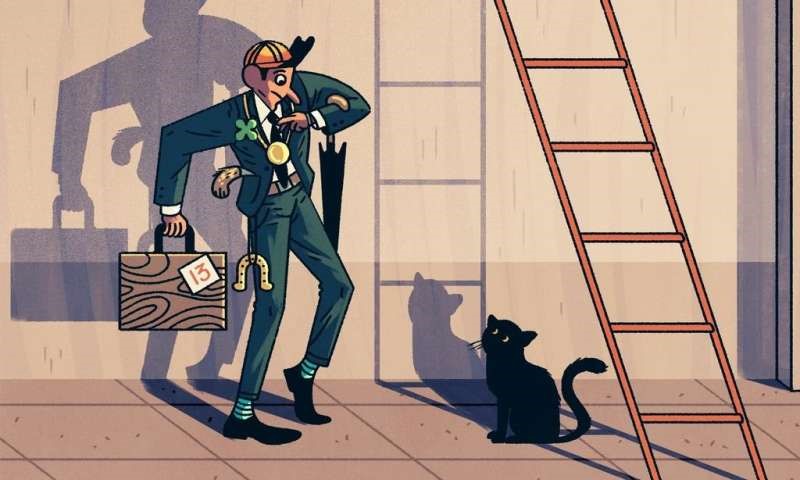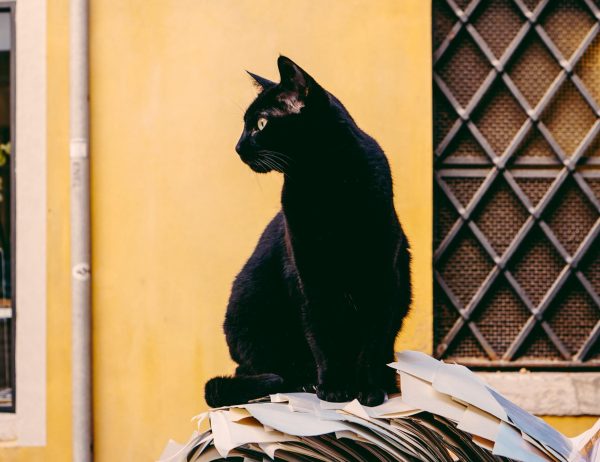
Glen Ellyn Public Library
You’ve probably heard someone say, “I keep my fingers crossed!”, but what does this originate from, and what does it mean? There are numerous sayings, known as superstitions, that have been around for many years, dating back to ancient times.
What Are Superstitions?
Before I dig deep into some popular and widely known superstitions, what exactly are superstitions? Superstitions are beliefs or customs that explain an unproven connection between events, suggesting that things like magic, luck, or supernatural forces have some kind of influence on an outcome. Many of these actually originated from different religions and cultures!
Different Superstitions
There are so many different superstitions, but what do they all actually mean?
“Step on a crack, break your mother’s back.” – This superstition refers to the belief that stepping on a crack in pavement or concrete will bring bad luck to your mother. Of course, this superstition is completely false and was only created by children in the 1800s to insult each other’s mothers, which is very interesting yet cruel.

Knocking on Wood – This phrase literally means to knock on wood. Someone would do this to ward off bad luck after making a boast, a favorable statement, or making a good prediction. They would effectively be “temping fate”. Although the origin of this superstition is unknown, some theories have emerged. One links to an ancient belief that good spirits settle in trees, and knocking on the bark was a way to use their protection for good luck. Another theory is that it originates from a 19th-century children’s game called “Tiggy Touchwood”, where touching wood is said to grant immunity from opposing players.
Breaking a Mirror – Some say that if you break glass from a mirror, you will get 7 years of bad luck. Some think a mirror doesn’t just reflect one’s appearance, but also their soul, and breaking it would “break the soul”, leaving it unprotected from unfortunate events. Others believe that a broken soul would seek revenge against the one who caused it harm, such as causing something horrible to happen to someone you know or are close to. This superstition is believed to have originated somewhere in ancient Greece or the Roman Empire, as the people who lived there thought that reflected images had mysterious powers.

Black Cats – I’m sure most of you have heard that if you cross paths with a black cat, bad luck, like death, will be brought onto you, but why black cats? In medieval times, animals with dark fur or feathers were thought to be associated with death. In the 16th century in Italy, many believed death would follow someone if a black cat were to lie on someone’s sickbed (where someone sick lies). On the contrary, though, if a white cat crosses your path, it is said to be good luck.
Fingers Crossed – When people cross their fingers, or say “I’ll keep my fingers crossed!”, this means they wish you good luck, but there are other interpretations of this superstition. Some cross their fingers to “invalidate” a lie, meaning if someone says one thing and crosses their fingers, they don’t mean it. This superstition is thought to have originated from pre-Christian times and the early days of Christianity, and was used to seek protection from evil and seal wishes or prayers. They would also cross their fingers while being untruthful to invalidate the lie.
Chewing Gum at Night – Originating in Turkey, many people say chewing gum at night wouldn’t be a great idea, as the gum would apparently turn to human flesh! This is clearly a lie, but was probably told to children to prevent them from chewing gum during the night, maybe to stop them from choking, or for other unknown reasons.
Walking Under a Ladder – This superstition is somewhat associated with bad luck. Some believe that walking under a ladder is really just unsafe, especially when someone might be working on it, and it makes sense. You probably wouldn’t want something to fall on your head! Though there are still some “bad luck” parts, like some people associating the shape of it with something used for execution many years ago. Another is linked to ancient Egyptian beliefs, where some thought walking under a ladder would risk encountering a god, and one other is tied to Christianity, who believe something called the Holy Trinity, which is composed of three things, that are commonly looked at like a triangle, and walking under a ladder is thought to be breaking that triangle, attracting evil spirits or bad luck.

Finding a Four-Leaf Clover – Many believe finding a four-leafed clover brings good luck and protection from evil. The four leaves are represented as faith, hope, love, and luck (success). This belief has been traced to have originated from ancient Celtic beliefs and Christian interpretations later on. Since four-leaf clovers are so rare, the symbol of good luck is contributed even further!
Wishing on a Wishbone – This superstition refers to when a wishbone (known as the forked clavicle) from a cooked bird is pulled on both sides by two people, the person with the bigger half gets their wish granted. This originated from the ancient Etruscans (ancient people from Italy), who thought birds to be fortune tellers, and this later spread to the Romans, and then to the English.
Beginner’s Luck – This superstition describes when someone new to some kind of activity does very well for their first time. For example, someone who’s never played basketball before keeps scoring three-pointers, and you’re left there thinking, “How?!” This is merely just probability; this person could fluke at any moment. Science disproves this superstition in many ways, though sometimes it could probably be believable.

No Umbrellas Inside – This superstition branches from a couple of different beliefs. One describes from ancient Egypt that opening an umbrella inside could infuriate the sun gods, suggesting that it would cause unwanted spirits to come indoors. There’s also the caution of large umbrellas that could cause property damage indoors.
Why Do Superstitions Persist In Modern Times?
Even today, people believe in superstitions, maybe from their culture or religion, but they overall provide psychological comfort from uncertain situations, offering answers or just as a coping mechanism to manage stress.